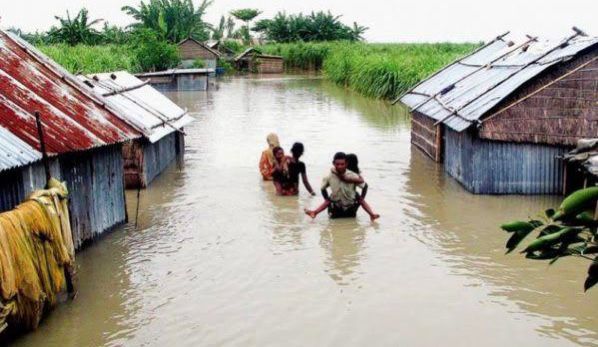Democratic Republic Of Congo’s Floods Leave Thousands Homeless
Democratic Republic Of Congo’s Floods Leave Thousands Homeless
In a makeshift camp for people displaced by floods in Democratic Republic of Congo, father-of-three Cyprien Seka anxiously watched his baby nap on the floor of a crowded tent and wondered if it would ever be safe to return home.
Torrential rains swelled the Congo river to its highest level in over 60 years in late December and forced around 500,000 people to flee the rising waters.
“It’s been almost a month since we left our homes because of the flooding… We are suffering,” Seka said at the camp on the grounds of a Catholic church on the outskirts of capital Kinshasa.
Like many others, Seka’s family lost almost all their possessions in the rush to escape. With some areas still under water, around 2,400 people have been crammed onto this compound for weeks.
Many have to sleep outside on the ground due to a lack of space in the shared tents.
“The night here is horrible,” said 55-year-old grandmother Pansel Moto Pamba. “There are many people spread out, crowded … it’s suffocating, you cannot breathe,” she said, showing the scrap of matting she lies on to sleep.
Sixteen of Congo’s 26 provinces are grappling with the fallout from the floods, which killed at least 221 people, damaged tens of thousands of homes, and exposed already vulnerable communities to increased risk of malaria and typhoid, according to the Congolese authorities and medical charity Médecins Sans Frontières.
The scale of the emergency has underscored the urgent need for improved flood management and response, particularly around the capital, said hydrologist Raphaël Tshimanga at the University of Kinshasa.
“The fear is enormous for Kinshasa, which receives the cumulative flow of the entire Congo basin,” he said, adding that high levels of deforestation were also worsening the impact of heavy rains.
Congo had the second-highest rate of tree-cover loss in the world in 2022 after Brazil, according to Global Forest Watch. This exacerbates flood risk because a forest’s canopy and roots trap rainwater and lessen flows into rivers, said Tshimanga.
More floods could threaten the 83 million people living near a major river in the Congo basin, which stretches across central Africa.
“What we’ve seen is likely to get worse … as far as analyses are concerned we’ve entered a wet period, when we’re likely to see more of these rare events,” Tshimanga added.
Reuters/Patience Ameh


Comments are closed.